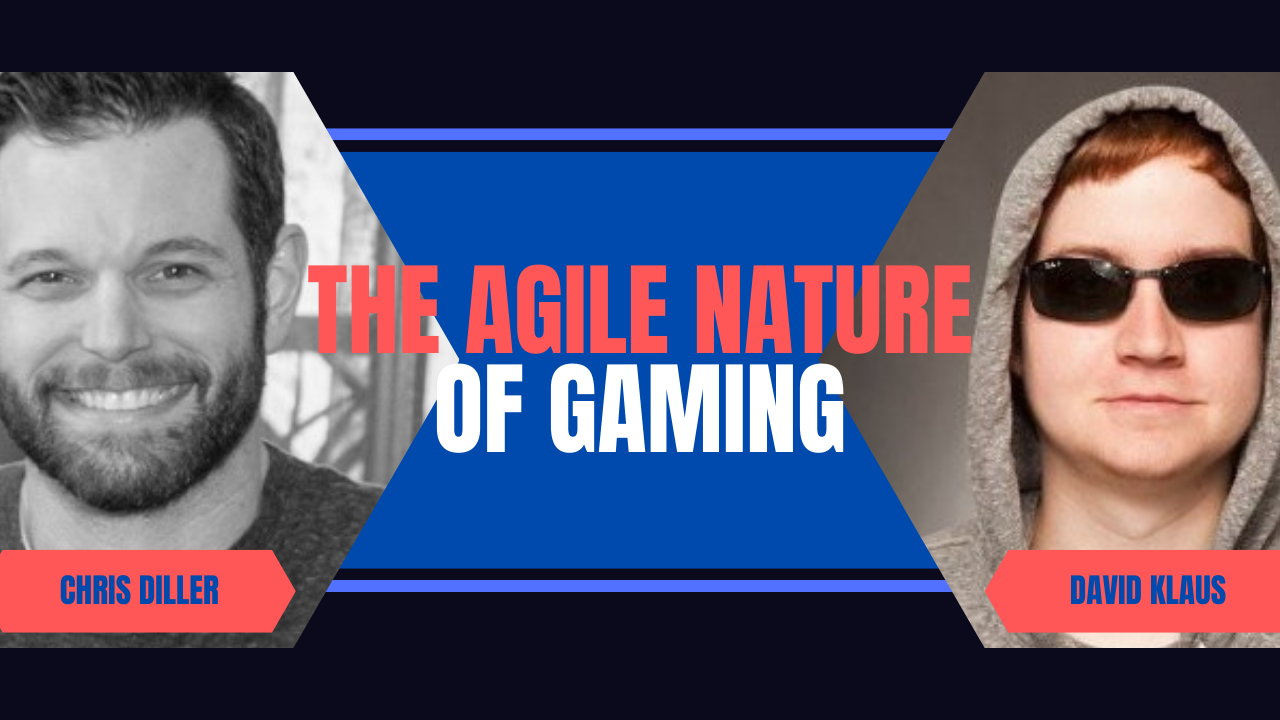06/08/2022

The Agile Nature of Gaming: Agile in Games and Game Development
Inspect and adapt. Sense and respond. Alpha Test. Beta Test. Play Test. Try, fail and try again. This theme of constant adjustment and tenacious iteration is common in every new game we play and every new game experience we create. And it’s central to Agile – the fundamental mindset behind numerous development frameworks originating in the software industry and now permeating into every aspect of the corporate world – including your favorite game studios. Join David Klaus and Chris Diller to explore the ways that Agile Values and Principles show up in the games you play every day and how you might be using some Agile practices without even knowing it.
Chris Diller
Chris is a Leadership Coach and Agilist with experience at multiple Fortune 500 companies. He began his career developing software in 2006, and held various roles including as an embedded software developer, project leader and ScrumMaster, but has jumped head-first into coaching since 2018. As an International Coaching Federation Associate Certified Coach, he has focused much of his practice on teams and emerging leaders – those in the early stages of transitioning to a full-time management position – but has had a range of clients from vice presidents and directors, to educators and aspiring entrepreneurs. Chris holds the Certified Team Coach certification from ScrumAlliance and has been active in the Scrum and Agile community as a conference speaker and organizer. When he’s not coaching, Chris enjoys being outdoors, playing games of all types, tinkering on the guitar, cheering for the Packers and, most of all, spending time with his wife and two young daughters.
Twitter - Twitter - Discord: RhompinRhino#0210
David Klaus
David enjoys working with individuals and teams to find processes that support what they do best, not get in the way of it. He’s experienced coaching teams and individuals across a variety of fields. He’s been leading and coaching teams since 2010 in a wide variety of fields: manufacturing, art teams in video games, and at a Fortune 500 retail company. Above all, he loves the relentless pursuit of learning and improvement. Outside of work, David can be found spending time with his family, playing video games, watching hockey, and generally just enjoying life. He finds inspiration in seeing groups of people with different perspectives and experiences come together to make something amazing.
LinkedIn - Twitch - Discord: MindbulletsDK#3589
Creation Through Destruction: Designing Experimental Legacy Games
JJ Otto-Hawke
Many of us have felt the pressure to be perfect, to always be at 100%, to push ourselves into giving our best effort again and again. This can manifest as a drive to collect and preserve, such as saving an expensive journal for the “perfect” project then never using it for its purpose. It’s no surprise, then, that people find destroying things so cathartic and satisfying. There’s a pleasure in setting yourself free psychologically while also being released physically.
JJ Otto-Hawke, a recent graduate from MIT’s M.S. program in Comparative Media Studies, discusses the iterative game design journey of their thesis. The work draws connections between physically, emotionally, and spiritually powerful media: storytelling, rituals, and games. Legacy games in particular employ mechanisms of liberation and transformation rituals, and their designs subvert many of the assumptions of traditional board games. JJ utilizes exploratory design research to test the boundaries of the game design space and discover what makes it tick. To create meaningful, playful social interactions, the experimental game iterations explore the power of various practices in their mechanics: fire, funeral rites, ancestral connections, generational knowledge, community-building, and more. The unique mechanism of “creation through destruction” emerged as the central tenet of memorable, meaningful legacy games, and is an important design consideration for future games.
JJ Otto-Hawke (they/he) is a writer, researcher, and gamer who recently graduated from MIT’s M.S. program in Comparative Media Studies. They are passionate about innovation in interactive narrative, diverse representation in games and worldbuilding, and novel ways to approach storytelling. Their thesis research explores the transformational power of legacy-style games, TTRPGs, and collaborative worldbuilding, as well as the ethos of human-centered design and exploratory design research methodologies. JJ’s games engage players in the full design process and draw from a diverse range of sources: theater, museums, ambient media, activist spaces, performance art, and more. Through unique narrative structures, cooperative play, and thoughtful representation, JJ aims to bring new players and experiences to game culture and make it more accessible to diverse groups.
Watch on Youtube
Back to History